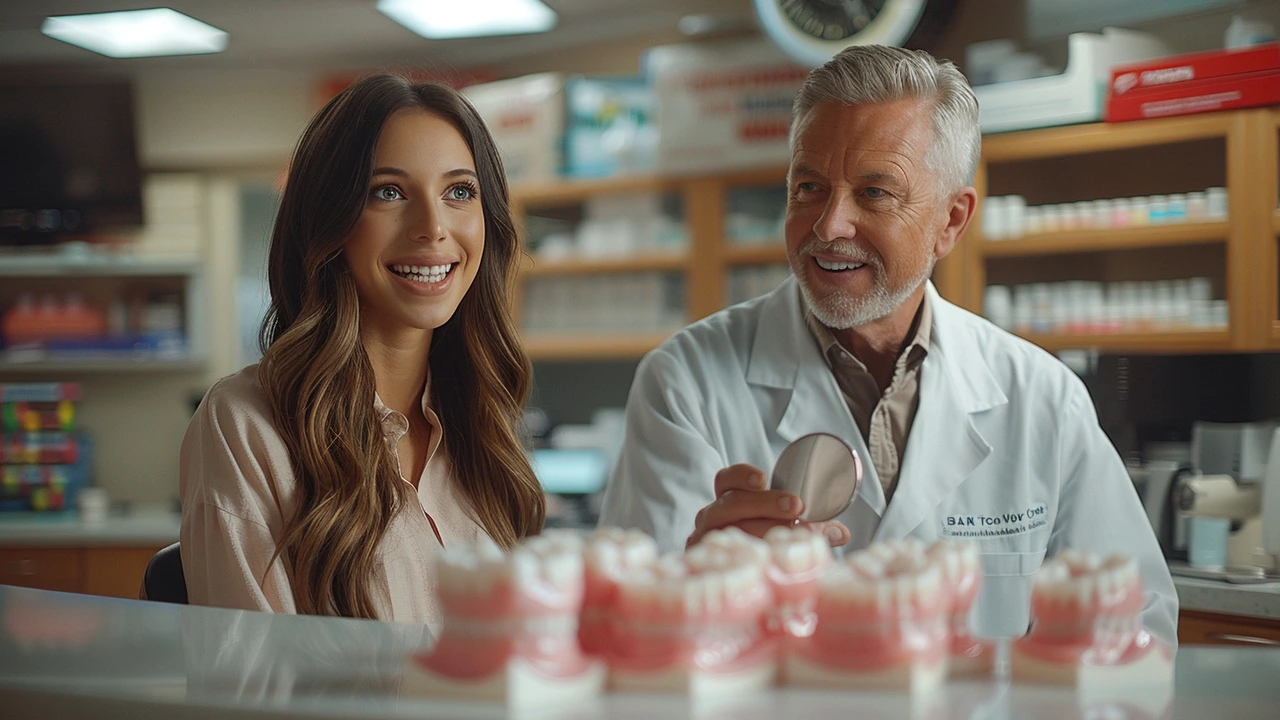
When it comes to transforming your smile, dental veneers can be a game-changer. However, finding the right dentist is crucial to achieving the best results. It's not just about the final look; the journey towards your new smile involves careful considerations and professional expertise.
Dental veneers are wafer-thin shells designed to cover the front surface of teeth. They can fix a multitude of cosmetic issues such as discolored, chipped, or crooked teeth. But to get the most out of these porcelain wonders, you need a skilled and experienced dentist who understands your unique needs.
- Understanding Dental Veneers
- Qualities of a Good Dentist
- Questions to Ask Your Dentist
- Patient Reviews and Testimonials
- Post-Procedure Care
Understanding Dental Veneers
Dental veneers are an increasingly popular option for people looking to enhance their smile. These thin, custom-made shells are designed to cover the front surface of your teeth, transforming their appearance. Veneers are typically made of porcelain or resin composite materials, each having its own set of advantages.
Porcelain veneers are known for their durability and resistance to stains. They also mimic the light-reflecting properties of natural teeth more effectively. On the other hand, resin veneers are thinner and require less removal of the tooth surface before placement. Regardless of the material, the goal of veneers remains the same: to give you a radiant and natural-looking smile.
The process of getting dental veneers usually begins with a consultation. During this initial visit, your dentist will evaluate your teeth to determine whether veneers are a suitable option for you. Digital or physical impressions of your teeth might be taken to create your custom veneers. Some dentists may even use advanced imaging technology to give you a preview of how your new smile will look.
"Dental veneers offer a versatile solution to address a variety of cosmetic dental issues, helping patients achieve a smile they are proud to show off," says Dr. Marcus Jackson, a renowned cosmetic dentist.
Once the veneers are ready, the next step involves preparing your teeth. This may include reshaping the surface or trimming a small amount of enamel to ensure a snug fit. Local anesthesia is typically used to minimize discomfort. Afterward, your veneers are bonded to your teeth with a special adhesive that hardens under a curing light.
Another thing to consider is the lifespan of veneers. Porcelain veneers can last anywhere from 10 to 15 years, while resin veneers may need replacement sooner, generally within 5 to 7 years. Proper care, which includes maintaining good oral hygiene and visiting your dentist regularly, is crucial for making the most of your investment. Veneers are strong, but they aren't invincible. Avoid chewing on hard objects such as ice or pencils to prevent damage.
Qualities of a Good Dentist
Choosing the right dentist to get your dental veneers is not just a matter of convenience; it's about finding someone with the right mix of skills, experience, and approachability. A good dentist can make the difference between an ordinary smile and an extraordinary one. So, what are the qualities that you should look out for?
First and foremost, experience plays a pivotal role. Look for dentists who have been practicing for several years, particularly those who specialize in cosmetic dentistry and have ample experience with veneers. An experienced dentist is more likely to have encountered a variety of dental issues and knows how to address them effectively. Checking their credentials and certifications is a good starting point.
Another important quality is attention to detail. This meticulousness is crucial in dentistry, where even a millimeter can make a significant difference. Good dentists take their time to analyze your dental structure, discuss your goals, and plan the course of treatment. They should be able to provide a detailed preview of the outcome, often using digital imaging technology.
Communication skills cannot be overstated. Your dentist should be someone who listens to your concerns and answers your questions thoroughly. It's important to feel comfortable discussing your dental history and expectations. The best dentists educate their patients, explaining the procedure, risks, and benefits so you can make informed decisions. Remember, this is a collaborative effort.
In addition, patient reviews and testimonials can provide tremendous insight into a dentist's reputation. Websites like Healthgrades and Yelp are filled with reviews from real patients who share their experiences. While it's normal to see a mix of reviews, consistently positive feedback about a dentist’s professionalism, empathy, and results is a good indicator.
It's also worth mentioning the technology and equipment used by the dentist. Modern procedures for dental veneers rely on advanced technologies. Lasers, digital scanners, and 3D imaging systems can make the process more accurate and less invasive. Dentists who invest in the latest equipment are showing their commitment to providing high-quality care.
Then there's the matter of continuing education. The field of dentistry is constantly evolving, and a good dentist should stay updated with the latest advancements and techniques. Look for professionals who actively participate in workshops, conferences, and courses. This commitment to learning ensures that they are well-versed in the best practices and innovations.
Lastly, consider the personal approach of a dentist. It's essential for you to feel at ease in their chair. Great dentists build a rapport with their patients, creating a trusting and supportive environment. They should customize treatments to suit your specific needs rather than taking a one-size-fits-all approach. This personalized care not only enhances the outcome but also the overall experience.
"A great dentist is one who combines technical prowess with a genuine concern for their patients' well-being," says Dr. Samantha Lee, a renowned cosmetic dentist.
In essence, the key to finding the right dentist for your dental veneers lies in a combination of experience, attention to detail, communication, use of technology, ongoing education, and a personal touch. Don’t rush the decision. Take your time to research, ask questions, and consider all these factors carefully to ensure you're making the best choice for your beautiful new smile.

Questions to Ask Your Dentist
Choosing the right dentist for your dental veneers requires more than just a quick online search. During your initial consultation, it's important to have a list of questions ready to ensure the dentist is qualified and the technique aligns with your expectations. This interaction can shed light on their expertise, the materials they use, and their approach to patient care.
First, it's crucial to ask about the dentist's experience with dental veneers specifically. Knowing how many veneer procedures they have performed and their success rate can provide significant insight. Additionally, inquiring about before-and-after photos from previous patients can help you gauge the quality of their work. This visual evidence is often more telling than words and can set your mind at ease or raise red flags.
One question not to overlook is the type of materials they use for the veneers. High-quality porcelain is often preferred because it mimics natural teeth better and is more durable. Understanding the options available can help you make an informed decision that balances aesthetics, functionality, and cost. Don’t shy away from discussing budget early on; it’s essential to know the overall financial commitment and what your insurance might cover.
Another key aspect to consider is the dentist’s approach to preparing your teeth for veneers. Some methods are more conservative and preserve more of your natural tooth structure. Asking about the preparation process can offer peace of mind, ensuring you are not subject to overly aggressive treatments. Additionally, it's wise to inquire about the expected lifespan of the veneers and the kind of maintenance they will require.
Communication is another vital corner. Ask how involved you will be in the decision-making process. A skilled dentist will not just tell you what to do; they will listen to your concerns, explain options, and ensure you are comfortable with all steps. Trust and mutual understanding are crucial. You may want to ask about follow-up visits and what you can expect in terms of post-procedure support. A well-detailed aftercare plan can make a significant difference in the longevity of your veneers.
According to Dr. John Smith, an experienced cosmetic dentist, 'Patients should feel confident to ask about the dentist’s qualifications and any continued education they pursue. Keeping up-to-date with modern techniques and materials is important for providing the best care.'Finally, understand the risks and potential complications. Any medical or dental procedure carries potential risks, and being well-informed helps you prepare better. Discussion around potential sensitivity, damage to natural teeth, or the possibility of needing repairs down the line are all important points that should be clarified.
In your quest for the perfect smile, being thorough with your questions can make all the difference. Each answer provides insight not just into the procedure but also into the dentist's expertise and dedication to patient care. Take the time to prepare, research, and have an open conversation with your dentist to ensure your journey towards a brilliant smile is smooth and successful.
Patient Reviews and Testimonials
If you're on the hunt for the perfect dentist to get your dental veneers, patient reviews and testimonials are your goldmine. They offer real, unfiltered insights into what you can expect from a dentist's practice. These reviews are often found on various online platforms and provide a snapshot of a patient's experience from the moment they walked into the clinic to the final unveiling of their new smile.
While sifting through various reviews, look for common themes. Are multiple patients praising the dentist's ability to listen and understand their concerns? Do they mention the cleanliness of the clinic, the friendliness of the staff, or the efficiency of the process? These recurring points can be strong indicators of the quality of care you'll receive.
Consider this – patients who have had positive experiences are more likely to elaborate on specific details. For instance, they might talk about how the dentist explained every step of the veneer process, easing any anxieties they had. They might also mention how their veneers look so natural that people can't even tell the difference from their real teeth. Such detailed feedback is invaluable when making your decision.
According to a study published in the British Dental Journal, 74% of patients base their choice of dentist on online reviews and testimonials. This highlights the weight of peer opinions in the decision-making process.
It's also helpful to pay attention to any negative reviews. Not to be deterred by a single bad review, but if multiple patients mention similar issues, whether it's about billing practices, rushed appointments, or poor communication, these could be red flags. On the other hand, observe how the dentist's office responds to negative feedback. A professional and empathetic response often indicates a practice that values patient satisfaction and is willing to make amends.
Moreover, testimonials can often be found on the dentist's own website. While these are likely handpicked, they still provide useful insights and can give you an idea of what the dentist considers to be their strengths. Some clinics even offer before-and-after photos of patients, which can give you a visual sense of their work. Don't hesitate to reach out to the clinic for more testimonials or even direct references if you're still unsure.
Lastly, joining dental forums and community groups online can also yield firsthand knowledge. Here, you can ask questions and get responses from people who've undergone similar treatments. Sometimes, personal recommendations from these groups can guide you to dentists who might not have a large online presence but excel in patient care. Remain patient and objective as you gather these reviews. Patient testimonials are a treasure trove of information when choosing the right dentist for your veneers.

Post-Procedure Care
Caring for your new dental veneers properly is essential to ensure they last a long time and maintain their aesthetic appeal. Understanding and following the right post-procedure guidelines will help you enjoy your upgraded smile.
Immediately after getting your veneers, avoid hard foods and beverages that can stain, like coffee or red wine. Your dentist may advise you to stick to softer foods for the first 48 hours. This helps in allowing the bonding material to set properly. It's crucial now more than ever to maintain excellent oral hygiene. Brushing twice daily and flossing will help keep your veneers gleaming.
Another critical aspect of veneer care is routine dental checkups. Schedule regular visits to your dentist for professional cleanings and inspections. These visits help identify any potential issues early, such as veneer misalignment or gum disease. The Australian Dental Association points out that regular dental visits can help maintain both natural and artificial teeth in top condition.
It's not uncommon to experience some sensitivity to hot or cold after the procedure. This usually subsides within a few days. If the sensitivity persists, consult your dentist. They might recommend specific toothpaste designed for sensitive teeth. Avoid using your teeth as tools. Do not bite your nails or open packaging with your teeth, as these actions can damage your veneers.
If you grind your teeth, also known as bruxism, you should discuss it with your dentist. They may recommend a nightguard to prevent damage to your veneers while you sleep. This small but significant step can considerably prolong the life of your dental enhancements. Proper care doesn’t only involve what you do but also what you avoid. Smoking can stain your veneers just as it can your natural teeth. Reducing or quitting smoking will not only benefit your veneers but your overall health as well.
Be gentle with your veneers. While they are durable, they are not indestructible. Avoid chewing on ice or using your teeth to open bottles or packages. These actions can chip or crack the veneers, necessitating costly repairs or replacements. Lastly, the material of your veneers matters as well. Porcelain veneers are stain-resistant, but composite resin veneers may require more careful maintenance to keep them looking their best. Discuss with your dentist which type best suits your lifestyle and needs.
“With the right care, dental veneers can enhance your smile for many years,” says Dr. Mark Hughes, a renowned cosmetic dentist.
By following these guidelines, you can ensure that your dental veneers remain in excellent condition, allowing you to smile confidently for years to come.
Write a comment
More Articles

How long does it take to apply invisalign?
As someone who's gone through the Invisalign treatment myself, I've gathered some useful insights about the process. This post will be primarily focused on one crucial detail - how long it takes to apply Invisalign braces. It's an important aspect to be aware of as it can help you plan and minimize any inconveniences. Rest assured, I'll cover everything you need to know about the duration and what you can expect during this orthodontic journey.

How does dental tartar affect children's performance in sports?
Hey there! As a devoted blogger, I'm here to shed light on a surprising connection - how dental tartar can affect your child's performance in sports. It's a topic we seldom think about, but it's crucial for keeping our kids at their best. Poor oral health, particularly dental tartar build-up, can cause discomfort, lower self-confidence, and can even hinder our kids' abilities in sports. Stay tuned as we uncover more about how maintaining pillowy vibes in your child's oral hygiene can boost their sports performance.

Step by step: How to take care of removable braces
Hi there! Are you wearing removable braces and seeking ways to maintain their hygiene? Do not sweat, I'm here to guide you. In this article, we’ll go through a step-by-step process on how to take care of your removable braces. Brace yourself for a journey into the world of orthodontic care that will ensure your dental investment remains sparkling and effective! Let's get started!


